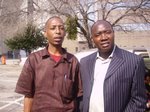By Karithi A. Ngeera
The rot in Kenya can be squarely blamed on poor quality leadership. This in turn results from voters electing incompetent leaders at all levels due to their poor understanding of democracy and elective politics. Although Kenyans have attained reasonable levels of civic awareness since the clamour for multipartism started in 1990s, more needs to be done in form of civic and voter education.
Voter education is the dissemination of information, materials and programmes designed to inform voters about the specifics and mechanics of the voting process for a particular election. It covers issues like ; who is eligible to vote; where and how to register; checking voter lists in advance; what type of elections are being held; where, when and how to vote; who the candidates are; how to file complaints; election violence and other malpractices; voting methods and systems and any changes in election law among others.
Civic education on the other hand is broader and is aimed at motivating citizens to participate in elections and other democratic activities. It conveys knowledge of a country’s political system and context covering issues like; the system of government; the nature and powers of the offices to be filled in an election; the principal economic, social and political issues facing the nation; the value of democracy; the equal rights of all citizens; the importance of peace and national reconciliation, manner in which an honest election can contribute to peace, development and growth of democracy among others.
Voter education is effective when linked with a programme of civic education that puts the election into context and provides an explanation of the election’s purpose, the surrounding issues, and their significance. Since electoral and governance systems change over time, it is vital that civic education is continuous and hence the need to integrate it into the school system so that young citizens can appreciate and embrace democracy and elective politics early in life.
A massive voter and civic education is particularly vital and urgent in the run up to the 2007 general election due to the following:
The perennial low participation of women, youth and other marginalized groups needs to be arrested. Effective education accompanied with creative mobilization campaigns would bring more of them on board because when such an important constituency excludes itself from elections due to ignorance, apathy and sheer laziness, this makes a joke about the “freeness, fairness” of such an election.
Low voter registration is another problem that undermines the usefulness of elections. Regrettably, some areas only register thirty percent of the eligible voters. These people unwittingly lock themselves out of an important decision-making activity that often determines a country’s destiny increasing their own marginalization. Effective education and awareness campaigns can boost this figure to more reasonable levels like seventy percent.
Shocking still is the fact that even among the registered voters; a big number does not turn out to cast their ballots. This reeks of laziness and lopsided priorities among voters resulting from ignorance about the crucial role played by political leadership in their lives. This “non voting group” commits serious crimes against democracy because it “votes in” bad leaders by default because it fails to block them from being elected. This group needs help in form of education and awareness creation.
Voters who participate in election violence, bribery and other malpractices are a liability to the growth of democracy in Kenya. Effective education would liberate them to realize that by being used to do dirty work by politicians, they auction their destiny, that of their children and all their future generations. Informed voters who cannot resist bribes due to poverty can still make a right choice, since actual casting of the ballot is secret. It is worth noting that election violence is one of the factors that discourage women from participating in elections as both voters and candidates.
Voter education will also reduce retrogressive cultural practices that bar women and youth to participate in communal activities which includes political meetings, standing for elections and even voting. It will also reduce ridiculous practices whereby women are expected to vote according to instructions given by their husbands or parents.
Free, fair and genuine elections are also new in Kenya having taken root with the beginning of multipartyism in 1990s. During the single party dictatorship, elections were mere rituals of endorsing candidates “supported from above”. Voters therefore developed a mentality that their vote is inconsequential since elections were always rigged, sometimes in advance. People need to be educated now to realize that times have changed and their vote actually counts.
Regardless of the democratic steps that we have taken, Kenya is still in transition from single party dictatorship to a true democracy. Education is required to get the voters out of the old “victims of dictatorship mentality” and develop a new mindset of “liberated citizens” who determine their destiny as well as familiarize them with the new democratic institutions that we have been establishing and nurturing. There are also some archaic laws that parliament has scrapped but continue to be applied by local administrators because of people’s ignorance.
The many spoilt votes that are proudly announced by election officials should jolt our attention to the fact that these are people’s choices that electoral process miserably fails to capture and which may actually change who gets elected. Effective voter education can reduce this unnecessary “wastage of people’s genuine decisions”.
That tribalism greatly Kenya’s voting pattern is a great indictment on our failure as a country to educate the masses. It is only a very backward and ignorant voting population that equates belonging to the same tribe with possessing leadership qualities. This education, done effectively can root-out political miscreants who hide under tribal cocoons and continue conning their way back to leadership positions.
High illiteracy levels in Kenya means that many people do not understand democratic processes and elections. Illiterate voters need special packages in vernacular, simplified, and adapted to their specific situations and areas.
Special voter education programmes are also required for minority groups, internally displaced persons and other marginalized segments of society who naturally have high degrees of apathy. It will make them understand their rights and the importance of participating in elections and that by choosing good leaders they are attacking their marginalization and bringing themselves to the mainstream of the society.
Civic educators should also take advantage of tolerance for divergent views being experienced under this regime to educate the voting masses and make a lasting impression. It is worth noting that the 2002 general election became successful and largely free and fair because of the massive education campaigns that were conducted before the elections.
How should this education be conducted?
Given that elections are highly political, it is of paramount importance that civic and voter education is neutral, accurate and professionally done so that it is not seen to be favouring any political party or candidate. One coordinating body should ensure quality control and Electoral commission of Kenya would be the best suited for this role.
To be effective, the trainings should be multifaceted and a mix of approaches should be employed like: direct mailings to voters, street theatre, role playing, radio spots, jingles, songs, comic strips, Internet campaigns, brochures and pamphlets. This would reduce monotony and make the voters interested to learn. The trainings should also be gender sensitive, all inclusive and community-based.
In the long run voter and civic education should be integrated in school curriculum so that when children reach voting age they will already understand the basis of the national and local politics and electoral systems.
Who would participate in conducting this education?
Women and youth associations and groups are best placed to reach their members. They can be assisted to come up with messages that resonate with their members. The on-going Vijana Tugutuke campaign is a good attempt at this and should be rolled out countrywide not in selected number of urban centres.
The churches, synagogues, temples and mosques who are in touch with voters among their congregation at least once a week should utilize every opportunity, possibly take a few minutes after their services to instil civic awareness and also continuously carry out civic and voter education. The church has a sacred duty to guide their flock in matters that are important to their lives. Although man does not live on bread alone, it will be difficult to spread the word of God among hungry and sick congregation, hence their flock need a functioning democracy and economy to achieve some basic level of worldly comforts. The clergy cannot teach hungry people not to steal and expect to succeed.
Charitable organizations and related members of the civil society can bring their experience of developing educational materials into this. We have seen their excellent creativity in developing and disseminating materials for HIV/Aids education campaigns. They can also provide funding and logistics for implementing these trainings on the ground. They are also good at gender mainstreaming and can add the gender angle into the whole programme.
Political parties through their membership and organs are also a good vehicle for this education. These parties should stop senseless propaganda and ran genuine awareness campaigns that can take democracy in Kenya to the next level.
The media can play a key role in breaking down negative stereotypes of women, youth and marginalized people and encouraging their full participation. Media owners and managers should allow some free or at least subsidized airtime to civic educators to talk directly to the voters. They should allocate some free time for continuous civic and voter education as part of corporate social responsibility.
The electoral commission of Kenya would play a vital coordination and quality control role by: harmonizing the curriculum, vet all materials and participating organizations, developing and disseminating comprehensive guidelines, monitoring for impartiality and professionalism to ensure the trainings are accurate and politically neutral.
ECK can also utilize the various opportunities it interacts with voters to pass on these important messages for example: during registration, when they check the register, when the change voting station among other golden opportunities. Their offices countrywide should be manned by trained officers who can pass these voter and civic education messages and respond to the questions of the voters through out, whether it is election year or not.
The international community other than endlessly grumbling about corruption and bad governance can take this golden opportunity to support education of Kenyans to be able to solve their own governance problems. They have the funds and the expertise in developing training materials and also offer logistic support to training implementers. Bad mouthing Kenya for all sorts of governance and leadership shortcomings without taking positive action supporting civic and voter will is of no use to anybody.
Teaching a society how to fish is more important than supplying them with a thousand years supply of fish. All friends of democracy in Kenya should come together and launch a massive voter and civic education campaign in readiness for the 2007 election which will be the second ever genuine election in Kenya’s history. Kenya’s leadership and governance problems will only be solved by Kenyans themselves if they are empowered to participate in democratic activities and make right political decisions through education and awareness campaigns.
-The writer is a Business Consultant Based in Nairobi
Other Insights
Tuesday, July 24, 2007
Subscribe to:
Post Comments (Atom)





























No comments:
Post a Comment